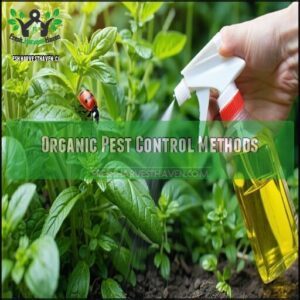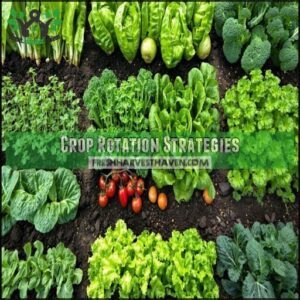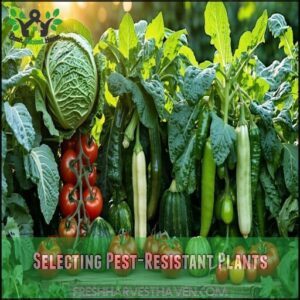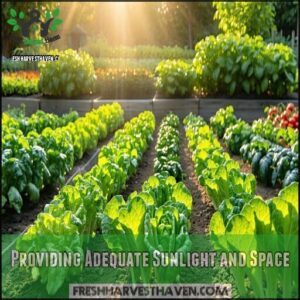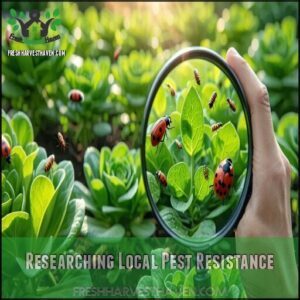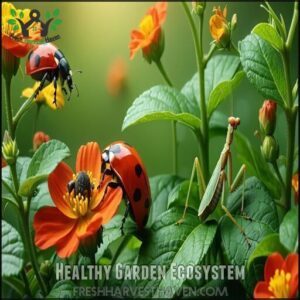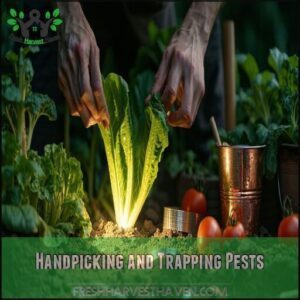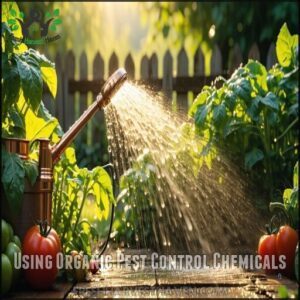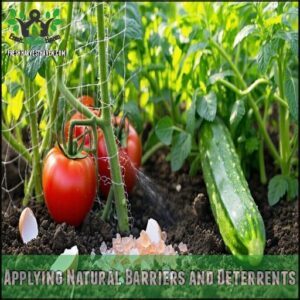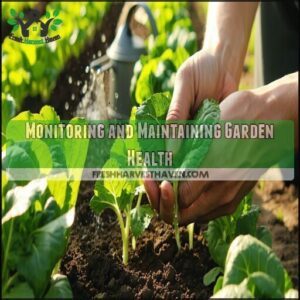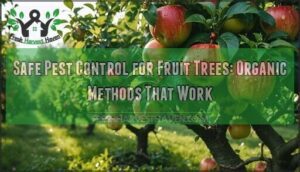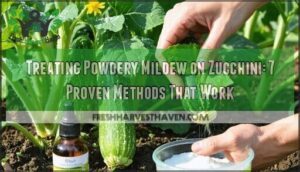This site is supported by our readers. We may earn a commission, at no cost to you, if you purchase through links.
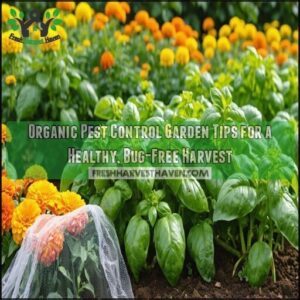 Organic pest control in your garden means working with nature, not against it. Start by planting pest-repelling herbs like basil and marigolds—think of them as your garden’s bodyguards.
Organic pest control in your garden means working with nature, not against it. Start by planting pest-repelling herbs like basil and marigolds—think of them as your garden’s bodyguards.
Attract “good bugs,” such as ladybugs and lacewings, by adding nectar-rich flowers; they’ll munch on pests for free. Physical barriers like row covers keep the worst offenders away, while crop rotation confuses sneaky insects looking for a meal.
If pests do show up, try neem oil or diatomaceous earth—both safe and effective. By fostering a healthy ecosystem, you’ll stay ahead of pests and watch your plants thrive. Curious how flowers play defense? Stay tuned!
Table Of Contents
- Key Takeaways
- Organic Pest Control Methods
- Preventing Garden Pests
- Healthy Garden Ecosystem
- Effective Pest Management
- Frequently Asked Questions (FAQs)
- How do you control insects in an organic garden?
- What is the best natural pesticide for gardens?
- What do organic farmers use for pest control?
- How to get rid of garden pests without pesticides?
- How do I keep bugs out of my garden naturally?
- How do I keep pests out of my garden naturally?
- What is the best organic pesticide for vegetables?
- How do I get rid of organic pests in my garden?
- Which organic garden pest control products are best?
- Can organic pesticides be used in the garden?
- Conclusion
Key Takeaways
- Attract beneficial insects like ladybugs and lacewings with nectar-rich flowers to naturally tackle pests.
- Use natural sprays like neem oil or garlic spray to repel bugs without harming the environment.
- Plant pest-repelling herbs such as basil and marigolds as natural deterrents and companions for vulnerable crops.
- Rotate crops yearly to confuse pests and maintain soil health, boosting your garden’s resistance.
Organic Pest Control Methods
You don’t need harsh chemicals to keep pests at bay—organic methods work just as well and protect your garden’s natural balance.
Organic methods keep pests away while nurturing your garden’s balance—embrace nature’s way for thriving, chemical-free plants!
From homemade sprays to attracting helpful insects, you’ve got plenty of science-backed options to guarantee your plants thrive without unwanted guests.
Natural Insecticides and Repellents
Natural insecticides are easy to make and safe for your garden.
Try these DIY sprays for organic pest control:
- Soap solutions mix dish soap, oil, and water to suffocate pests.
- Garlic sprays repel with a pungent punch.
- Essential oils like peppermint or rosemary deter bugs naturally.
- Herbal repellents, such as neem oil, disrupt pest breeding.
Companion planting benefits by naturally deterring pests. Apply thoroughly for best results to ensure your garden remains healthy and pest-free, using these natural methods.
Attracting Beneficial Insects
Skip the sprays for a smarter approach: attract beneficial insects by creating a diverse habitat.
Plant attractant flowers like dill or alyssum, add water sources with pebbles for safe sipping, and provide nesting habitats using shrubs or native plants.
Consider using a specific attractant product to further enhance your garden’s appeal to helpful insects.
Reduced pesticides keep natural predators thriving, balancing your garden ecosystem. Think of it as hosting a bug-friendly block party—no RSVP needed!
Using Row Covers and Interplanting
Row covers and interplanting are your garden’s armor against pests. Row cover benefits include shielding crops from insects while letting sunlight and water through.
Pair this with interplanting techniques like companion planting for natural pest prevention. Use these pest barrier methods to enhance crop protection and organic pest control.
You can find various garden row covers for different needs.
- Shield young plants with row covers.
- Mix pest-repelling plants.
- Rotate crops yearly.
- Space plants strategically.
- Inspect covers regularly.
Planting Flowers and Herbs for Pest Control
While row covers shield plants, flowers and herbs work as nature’s bodyguards.
Companion planting with marigolds or nasturtiums deters pests, while lavender and thyme repel with their strong scents.
Herb guilds, like basil near tomatoes, confuse invaders, and strategic flower placement attracts predators like ladybugs for organic pest control.
This natural pest control method keeps your garden thriving and balanced.
Preventing Garden Pests
You can keep garden pests at bay by planning smarter, not working harder.
Simple steps like rotating crops, choosing resilient plants, and giving your veggies room to breathe make pests less likely to crash your garden party.
Crop Rotation Strategies
Crop rotation is your garden’s secret weapon for organic pest control.
By switching plant families annually, you disrupt the pest cycle and protect crops.
Rotation frequency matters—don’t repeat the same spot for at least three years.
This also boosts soil nutrient balance and encourages sustainable gardening.
Pair it with companion planting for smarter pest management and healthier harvests!
Selecting Pest-Resistant Plants
Choosing pest-resistant plants is like setting your garden up with natural armor.
Look for varieties bred to resist common pests and diseases. Combine this with companion planting and native plants to strengthen defenses. Keep an eye on seed selection for genetic diversity and resilience.
Proper sanitation practices are also essential for disease prevention.
These steps make organic pest control easier and your garden healthier:
- Tomatoes: Look for nematode-resistant varieties.
- Squash: Opt for varieties resistant to vine borers.
- Cabbage: Choose types that deter cabbageworms.
- Peppers: Select aphid-resistant strains.
- Beans: Pick rust-resistant cultivars.
Providing Adequate Sunlight and Space
Good spacing isn’t just polite for people—it’s essential for plants.
Overcrowding creates shading effects, limits air circulation, and stresses plant health. Follow spacing guidelines based on growth habits to manage plant density effectively.
Sunlight requirements vary, so position sun-loving veggies like tomatoes optimally. Prioritize garden care with proper spacing, boosting organic garden health while keeping pests less interested in your overcrowded buffet.
Researching Local Pest Resistance
Understanding pest resistance starts with knowing your local invaders.
Explore pest control surveys and community knowledge sharing for insights on regional pest variations. Research native predator effectiveness and choose plants with soil-specific defenses.
Don’t ignore gardener experiences—priceless for tackling garden pest challenges. By staying informed, you’ll master regional plant resistance and outsmart even the trickiest bugs!
Healthy Garden Ecosystem
A healthy garden ecosystem is like nature’s team of superheroes, quietly working to keep pests in check while boosting your plants’ health.
By inviting beneficial insects and maintaining biodiversity, you’ll create a balanced environment where your plants thrive and pest problems stay under control, which is a key aspect of a healthy garden ecosystem.
Encouraging Beneficial Insects and Creatures
Boost your garden ecosystem by attracting natural predators and beneficial insects.
Build habitats like birdhouses or bat houses to invite bug-eating allies. Create a diverse ecosystem with plants that produce nectar and pollen.
Encourage insect balance by planting a mix of native species. In organic gardening, companions like ladybugs and praying mantises are the unsung heroes that protect your plants naturally.
Creating Habitat for Pollinators
Your garden can be a buzzing paradise by creating pollinator gardens bursting with native plants.
Add water sources like shallow trays or birdbaths and keep shelter options cozy with reduced mowing areas or logs.
Pollinator-friendly herbs and flowers like lavender or thyme attract beneficial insects.
A thriving mix of plants boosts biodiversity, making your garden both beautiful and balanced.
Maintaining Biodiversity in The Garden
A thriving garden biodiversity means a bustling ecosystem.
Mix native plants with a variety of flowers to boost soil health and attract beneficial insects.
Create predator habitats using logs or shrubs—they’ll keep pests in check naturally.
Pollinator diversity also keeps your garden buzzing with life.
Organic gardening thrives on balance, so embrace natural pest control methods for harmony.
Fall is also a great time for removing weeds and debris to improve soil health.
This approach supports a thriving garden and maintains ecosystem balance.
Using Diatomaceous Earth and Neem Oil Effectively
Imagine your garden thriving with minimal pests—diatomaceous earth and neem oil can make it happen.
Timing matters:
- Dust DE on moist plants to remove aphids and ants.
- Neem dosage? A tablespoon in a gallon of water works wonders against beetles.
- Spray evenings to avoid sunlight damage.
Always follow safety precautions—protect kids, pets, and pollinators while mastering organic pest solutions.
Using diatomaceous earth products can greatly help.
Effective Pest Management
You don’t need harsh chemicals to stay on top of pests in your garden; a few smart strategies can work wonders.
From handpicking bugs to using natural deterrents, you’ll keep plants thriving and bugs guessing.
Handpicking and Trapping Pests
Early mornings or evenings are perfect for handpicking pests.
"Slug Patrol" with a flashlight can be oddly satisfying. Try beer traps to lure slugs or scatter crushed eggshells and use copper tape as barriers.
Yellow sticky traps catch flying invaders, while relocation strategies keep the ecosystem balanced. These hands-on methods make pest control straightforward and kind to your garden, using techniques like copper tape and relocation strategies.
Using Organic Pest Control Chemicals
Use organic pest control chemicals like Spinosad, Neem Oil, or Diatomaceous Earth wisely for maximum impact.
B.T. (Bacillus thuringiensis) is highly effective against larvae, while botanical insecticides like kitchen soap spray target soft-bodied pests.
Always follow label instructions, test on a small patch first, and apply carefully to protect beneficial insects.
Organic insecticides can balance pest control and eco-safety beautifully.
Applying Natural Barriers and Deterrents
Stop pests with simple, effective natural pest solutions.
Mesh fabric shields plants while letting sunlight in. Use organza bags to protect fruits from birds.
Scatter crushed eggshell barriers or lay copper tape to keep slugs out—a slug’s worst nightmare!
Add scent deterrents like garlic or peppermint sprays. These natural pest prevention methods build a healthier, bug-resistant garden naturally, using simple and effective techniques.
Monitoring and Maintaining Garden Health
Boost your garden pest control game by keeping a sharp eye on your soil health and plant nutrition.
Early detection is key—inspect leaves and stems for signs of trouble. Adjust watering practices and nutrient balance for stronger plants. Stick to smart pruning techniques to remove pests’ hideouts.
Knowing how to spot common pest characteristics is essential for early intervention.
| Task | Frequency | Why it Matters | Tips |
|---|---|---|---|
| Inspect Leaves | Daily | Catches early pest activity | Look under and between leaves |
| Assess Soil Health | Monthly | Promotes resilience | Test pH and adjust compost |
| Prune Damaged Areas | As Needed | Stops pest spread | Don’t overdo it; 1/3 max |
| Adjust Watering | Weekly | Prevents damp pest zones | Water in the morning |
Frequently Asked Questions (FAQs)
How do you control insects in an organic garden?
Think of your garden as a tiny battlefield where balance wins.
Use row covers, handpick pests at dawn, spray neem oil, or plant marigolds as repellent allies.
Let natural predators join your defense squad.
What is the best natural pesticide for gardens?
Neem oil is your garden’s best buddy.
It’s a natural pesticide that repels pests, disrupts their breeding cycles, and keeps your plants thriving.
Mix it with water, spray thoroughly, and watch nature balance itself!
What do organic farmers use for pest control?
Organic farmers rely on natural solutions like neem oil, garlic sprays, and diatomaceous earth.
They also invite pest predators, use crop rotation, and embrace companion planting to defend crops while keeping ecosystems balanced and thriving, utilizing natural solutions.
How to get rid of garden pests without pesticides?
Garden pests are like uninvited party crashers—annoying but manageable.
Use barriers like mesh or organza bags, handpick bugs at dawn, or spray neem oil.
Invite predator insects and plant pest-repelling herbs for organic defense.
How do I keep bugs out of my garden naturally?
Cover plants with mesh fabric to block bugs, handpick pests during cool mornings, and use homemade garlic spray.
Invite helpful insects, like ladybugs, and plant marigolds nearby—they’re like nature’s “Keep Out” signs for pests!
How do I keep pests out of my garden naturally?
Start with barriers like garden mesh to keep pests out while letting air and light in.
Combine natural sprays, companion planting, and regular handpicking.
Encourage predator insects—think of it as building your garden’s own defense team!
What is the best organic pesticide for vegetables?
Neem oil is your go-to organic pesticide.
It disrupts pests’ growth cycles without harming plants or helpful insects.
Mix it with water and soap, spray thoroughly, and watch aphids and caterpillars flee like bad houseguests.
How do I get rid of organic pests in my garden?
Tackle pests with simple tricks—use row covers, sprinkle crushed eggshells, or spray neem oil.
Handpick bugs at dusk, invite predator insects, and rotate crops yearly.
Mix solutions like garlic spray to defend naturally!
Which organic garden pest control products are best?
For effective organic pest control, try neem oil for caterpillars and beetles, diatomaceous earth for slugs, and garlic spray for aphids.
These options are safe, eco-friendly, and help your garden thrive naturally.
Can organic pesticides be used in the garden?
Imagine this scenario: squash bugs overrunning your zucchini.
Organic pesticides, like neem oil or spinosad, can fight back, but use them sparingly.
They’re eco-friendlier but still affect helpful bugs, so balance is key for success.
Conclusion
Let’s face it—those pests aren’t packing up and leaving without a fight.
But with organic pest control in your garden, you’ve got an arsenal that’s natural, effective, and kind to the environment.
From bringing in ladybug reinforcements to planting basil bodyguards, every step builds a thriving, pest-resistant ecosystem.
Stay vigilant, experiment with neem oil or row covers, and keep rotating those crops.
Your harvest will thank you, and hey, maybe even those hungry, confused bugs will reconsider.
- https://learn.eartheasy.com/guides/natural-garden-pest-control/
- https://www.mofga.org/resources/pest-control/controlling-pest-insects-in-the-organic-garden/
- https://rootsandrefuge.com/organic-garden-pest-control/
- https://www.motherearthnews.com/organic-gardening/organic-pest-control-zm0z11zsto/
- https://mariebostwick.com/natural-garden-pest-control-methods/

